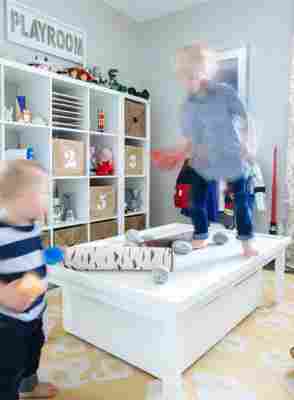
To put it euphemistically, my house is full of life. We have five children, ranging in age from 10 to 4 months. The only time we aren’t mired in chaos or teetering on the verge of it is for a couple hours after the brood is in bed—and that’s only when the 2-year-old isn’t escaping from his crib and joining us in the living room with a reckless cackle.
As my pal (good old Shakespeare himself) says, here’s the rub: I’m a Highly Sensitive Person and an introvert. From the bottom of my heart, I wouldn’t trade my family for anything, but sometimes I wonder how I, lover of quiet and order and delicious alone time, live in a house full of noise and messes and so many people! But I recently read one of those indelible books you text your friends about and it has me singing a new tune—especially in those moments when life feels overwhelming.
In “ Tell Me More: Stories About the 12 Hardest Things I’m Learning to Say ,” Kelly Corrigan walks readers through laughter and tears in an un-put-down-able collection of essays about phrases she’s learning to live by. One of these phrases is “it’s like this.” Or put less succinctly, “right now, it’s like this.” The implication of the statement is that it won’t be like this forever. It’s just like this—hurried, stressful, upsetting—right now.
“It’s like this”: How three words can get you through frazzled moments
Corrigan delivers her own story about how these three words became meaningful for her, but like any good art, the text has come to embody something extremely personal for me as well, something that has worked its way into my consciousness and colored my thinking. “It’s like this” has become what I tell myself when I feel close to being overwhelmed and it anchors me deep in a calm place of my soul, despite what’s external.
It’s different than than the exhortation to “embrace the chaos,” which has always connoted for me a kind of giving in. But “it’s like this” has enabled me to see the “embrace” as, really, a hug.

Picture this: My husband is working on a deadline, I need to get dinner on the table, two of the kids are bickering, another is literally pulling my apron strings trying to drag me to the fridge. Even the cats are milling for food. Embracing the chaos in this situation would be nothing more than a wry concession to the difficulty of this time of day. But reminding myself that “it’s like this” makes me smile inside. Here at this moment in time, we’re all together under one roof and all of us (myself included!) are hungry and grouchy. Totally normal and expected and won’t last forever. I’m wanted and I’m needed, and though in the moment pulling my hair out and screaming seems appropriate, both the moment and the epoch will pass. It won’t always be like this . It’s just like this right now.
“It’s like this” helps me relinquish control. So often I’m disappointed and irritable because I haven’t met my own expectations and others haven’t met the expectations I’ve (probably unfairly) imposed on them. But rather than perceiving a decision to let little things go as a lowering of my standards, I have come to (try to) chill out about kids who dump their backpacks on the floor while they race to microwave nachos for snack. Backpacks by the front door are part of it. Elementary school years are like this.
“It’s like this” has also become a kind of portal for me, a way to see the outward things that would typically drive me crazy as evidence of what those things point to intrinsically. Here’s what I mean: Inside-out dirty socks mean my children are home and making themselves at home; a cleaned-off counter that still has a sticky spot on hit means my husband tried his best to clean the kitchen; and dominoes scattered across the hardwoods mean that my son was inspired by the elaborate domino toppling videos we watched together on YouTube.
As is the case in so many instances, a perspective shift can drastically alter the experience of our particular situations and environments. “It’s like this” has given me a way to frame even the tedious and tiresome details of daily life—the very ones that can cause me to wish away the moments leading up to bedtime or indulge in outbursts of my not-best self—as the treasures of normal life that they are.
